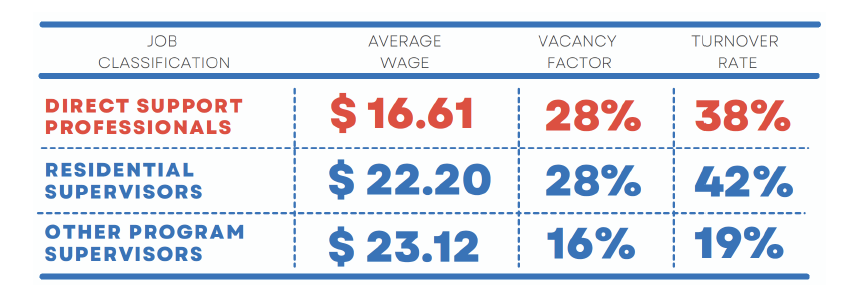HARRISBURG, Pa. (Jan. 5, 2023) — Low wages, high vacancy rates, and high turnover continue to plague providers who care for individuals with intellectual disabilities and autism (ID/A), according to a new study that dives deep into the financial trends driving the workforce shortage affecting all types of ID/A settings and individuals of all ages.
The Center for Healthcare Solutions, which has been conducting compensation surveys for health care, human services, and ID/A providers for more than four decades, collaborated with The Arc of Pennsylvania, the Rehabilitation and Community Providers Association (RCPA), and The Provider Alliance (TPA) to produce a detailed report on the state of the ID/A industry workforce. Among the key findings in the “2022 ID/A Benchmark Compensation Survey:”

“This wage study reinforces what we have been saying for a long time now. Low wages are directly related to the high turnover and high vacancy rates that we’re seeing among Pennsylvania’s ID/A providers, and the individuals who are affected the most are those seeking care and support,” said Richard Edley, Ph.D., President and CEO of RCPA. Beyond the findings on low wages and high vacancy turnover rates, the study also found that 41 percent of survey respondents are engaged in a more costly practice of contract staffing for services because of the workforce shortage. Fourteen percent of all DSP hours are paid at the overtime rate, and providers must dig deeper to provide credentialing incentives, tenure rewards, or bonuses simply to retain the workers they have. “With staff leaving these professions, ID/A providers are strained to serve the thousands of Pennsylvanians currently receiving and waiting for critical services,” said Sherri Landis, Executive Director of The Arc of Pennsylvania. Because human services like ID/A are funded primarily by Medicaid, providers cannot raise prices like private businesses to pay higher wages. Chronic underfunding by the state over the last decade has only exacerbated these staffing and operational challenges in the ID/A arenas. “Services are being reduced and, in some cases, eliminated entirely,” said Patrick DeMico, Executive Director of The Provider Alliance. “We can’t expect to recruit and retain direct support professionals at below-market wages and with no inflation adjustment for three years.” The survey mirrors other studies that have shown providers facing major staffing shortages, reducing caseloads, or cutting programs because of workforce issues, and trying to manage unprecedented vacancy and turnover rates, largely the result of inadequate state reimbursements that keep wages low. +++
